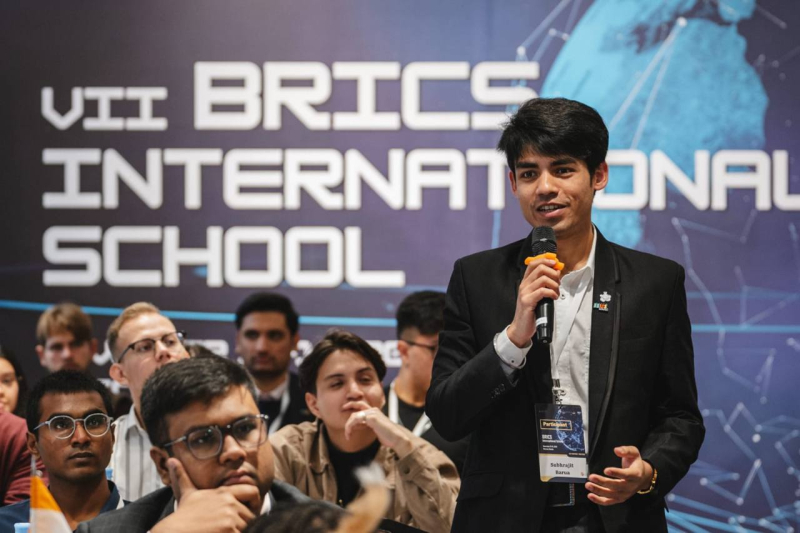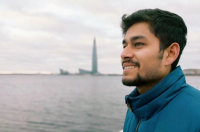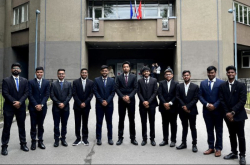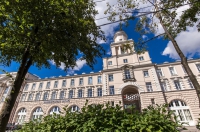Let's start by talking about the event you’ve recently been to, the BRICS International School. Could you tell us a little about it?
Sure. The 7th BRICS International School was a five-day event organized by the Russian National Committee on BRICS Research with support from the Ministry of Foreign Affairs and funding from various foundations. It is actually held annually in Moscow, but I learned about it from my friend here at ITMO only this year and decided to apply. The event is open to students not only from BRICS countries, but from anywhere in the world.
For my application, I had to submit a portfolio, a CV, and do a few tasks, including a one-minute introductory video and an essay. Overall, I cannot say that the application process was very challenging, but I did have to put the effort in. And it was worth it: I was selected as one of the 50 participants and my journey to Moscow, as well as my stay there, was fully covered by the organizing committee.
What was the event like?
It was a really great experience. On the first day we went to the Ministry of Foreign Affairs in Moscow and got to see the hall where press conferences are held. So, it was pretty amazing to see the whole setup. On that day, we also talked about what this school stands for, its aim, vision, and, of course, what BRICS is, what's the future of the organization and its long-term goals, and how youth can be involved in BRICS initiatives.
From your description, it sounds like an event for students of politics and international relations. You study natural sciences. How did you decide to participate and how did you feel once you were there?
This question was also on my mind when I applied to the school. I am always interested in doing something beyond my scope, because in the future, if I try to implement my ideas into practical systems, it would require me to get involved with the government. If I want to go international, I would have to know how to conduct negotiations and how to engage in international relations. So, that was my motivation for applying.
When I came to the school, I was pretty surprised because they had scientific tracks, as well. We had lecturers from the Russian Academy of Science, including professors in natural sciences. They spoke about the opportunities BRICS can create for students and researchers in this field. One of the suggestions that I raised during the event was to allow students to travel to the BRICS countries visa-free for internships. This idea was heard and appreciated by the officials present. One of the outcomes was that we were invited to many internships and exchanges in the future.
Apart from that, I got to know many people, networked, and learned about the different youth organizations in Russia, some of them working with such important topics as sustainable energy. So, all in all, I think scientists definitely had something to take away from this event.
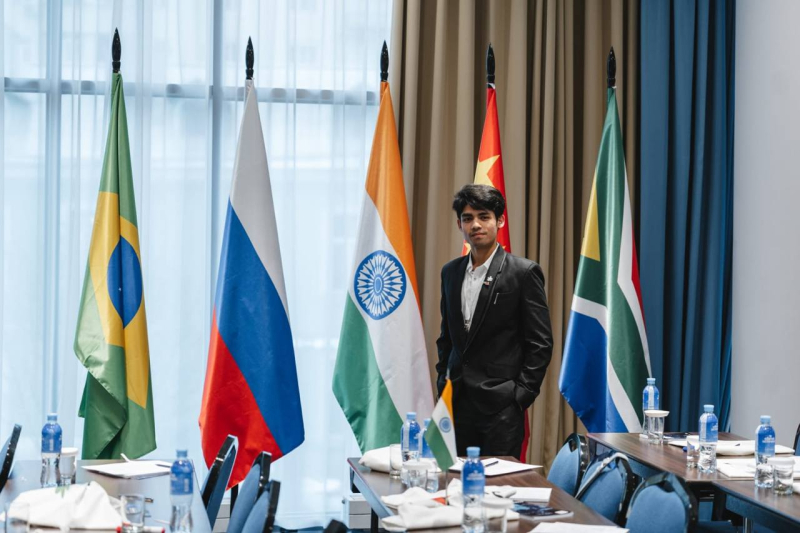
Subhrajit at the 7th BRICS International School. Photo courtesy of the subject
You mentioned networking – who did you get to talk to?
Of course, networking and making connections all over the world was one of the major things that we could do. There were people who came from South Africa, from Morocco, from Saudi Arabia. We got to know the students, but also some of the representatives who came from different organizations. I also talked to some professors from HSE Moscow because they were interested in doing some projects with Indian universities and I identified some of the challenges that they were facing in the communication. It helped me get in touch with them and will possibly lead to collaborations between ITMO and HSE. I actually enjoy doing this kind of work that involves negotiations and partnerships with organizations. So, hopefully we will have something cool in the future.
That sounds great and really promising. I also read in the school’s program that you had debates. What was it like?
Yes, it was really interesting: we were divided into different teams and each team was assigned a role, like G7, BRICS, or G20. And then they gave us a topic on which each organization was assigned a role – “for” or “against” – and we had to debate it out amongst ourselves. It was pretty interesting because we had to assume the perspective of a particular organization, even if sometimes we don’t personally agree with their strategies. We had to tune our brain and our words according to what they would say. The G7 team won. I think they were really impressive and well-spoken with their arguments.
What lesson, idea, or insight from the event do you value the most?
The most valuable insight was about cooperation. Hearing from other students helped me understand them on a deeper level and see the difference between personal interests and national interests. I also noticed that we seem to have similar problems – for instance, we all talk about inequality between very developed cities and less developed regions within the same country. So, we as youth can cooperate better if we recognize that we face the same challenges and have a common cause. We all want the same thing, which is betterment and development. And maybe we can push towards a future where we would have fewer conflicts amongst each other. So, maybe, going forward, the fact that we’ve discussed this together under the same roof will mean that we can understand each other better. I'm hopeful that cooperation will be the major learning point.
I'm hoping with you. Since we're in St. Petersburg and you traveled to Moscow, I have to ask you: Moscow or St. Petersburg?
I am still a newbie to Moscow, but my impression is that it’s huge and with a very developed infrastructure. I definitely missed the St. Pete architecture in the fast-paced and modern capital. But I think if there's a question of where I want to live, for me personally, it really depends on where I'm able to contribute more.
This sounds very deep and wise! Before we change the topic, I’d like to ask you about the 8th USERN Congress you've also recently participated in. Your supervisor's contributions are described in our previous story, but what did you bring to the table?
My talk focused on ashwagandha, a plant deeply rooted in India's traditional medicine (ayurveda) for millennia. I provided valuable insights into its role in reducing chronic stress and anxiety, adding an extra layer of significance to the broader discourse on holistic health and well-being.
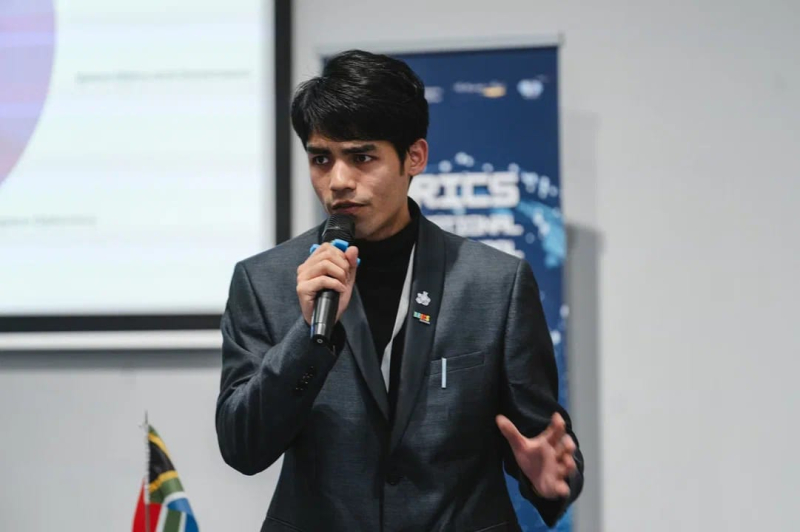
Subhrajit at the 7th BRICS International School. Photo courtesy of the subject
So, you’ve been at ITMO for several years now. In your first interview, you mentioned that you were fascinated with the university. Do you still have this feeling?
It's like any relationship. You are fascinated and charmed by a person first, but then, when you start spending many days, many years together, you definitely recognize some areas which can be worked upon. So, similar things have happened at ITMO. Sometimes there are off days and some things can be improved, but that doesn't change my mind – I still love ITMO the way I did when I first knew about it. I think that's how love works. If you can, you can give constructive criticism to make improvements. Obviously, my opinion is just my opinion; we have to appreciate everyone's when we are talking about changing something or improving something, but any of those experiences or incidents that I have had in these years don’t change the fact that it is still, in my opinion, the best place, the best university.
That’s heartwarming to hear. Are you enjoying your life as a PhD student here?
I believe it was fate that brought me to a PhD program here, because I was interviewing for different jobs for a while at the end of my Master’s and none of them really worked out. When I tried to return to St. Petersburg, everything went smoothly and so I came here. I would say that compared to what I have heard about a PhD student's life, I am enjoying it much more than most. Much credit to my teammates, my lab mates, and my supervisor because I don't face many of the things which I have heard other PhD students go through.
But doing a PhD is definitely challenging, because you need to find the time to do a lot of things. I think we live in a world where we have to be multifaceted and we have to be involved in several things. Gone are the days of getting one job and leading a happy life. We have to have multiple sources of income and everything. So, I think it's good practice and it's preparing me for the future.
What’s your secret to making it work?
I am very motivated thanks to my family, my friends, and my colleagues. My environment, the people around me definitely help me maintain this energy. So, keep your environment strong. Your surroundings should be very positive and they should motivate you always – I think that that's key.
Do you have any advice to international students wishing to excel in Russia?
Yes! You might come here and be very talented, there might be a lot of opportunities waiting for you here, but they won’t present to you right away. You need to go and tell people about your skills and how you wish to contribute. Just like that. Nothing happens like magic. Maybe if you talk to 10 people, only one would listen, but still you get 1 out of 10. If you don't talk to anyone, it wouldn't even be 1. This has helped me a lot – with getting my position on the editorial team and now assisting at the BIOCON conference (you can learn more about the conference here – Ed.).
For this, of course, you need to be an extrovert and I actually transformed myself into one. I learned not to judge myself and accept my mistakes, I stopped being afraid of others’ opinions about me. You have to be open and appreciate everything you do, including the errors that you have made. So, don't be so harsh on yourself first. And then, you will be able to be open to other opinions and the mistakes we all make.
